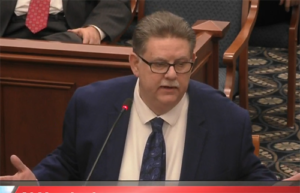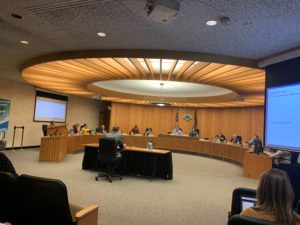 MAC has joined with six other organizations representing local governments, environmental causes and schools to urge defeat of a bill that guts local oversight over the location and operations of sand and gravel mining in Michigan.
MAC has joined with six other organizations representing local governments, environmental causes and schools to urge defeat of a bill that guts local oversight over the location and operations of sand and gravel mining in Michigan.
The Senate Transportation and Infrastructure Committee is holding its second hearing today (Jan. 29) on Senate Bill 431, which would allow sand and gravel pits to operate essentially whenever and wherever they would like. The unnecessary and overreaching bill, sponsored by Sen. Adam Hollier (D-Detroit), would eliminate zoning authority and oversight capability from local governments—regardless of where the operation is located or its impact to nearby residents, schools, businesses, hospitals or others.
“The bill has two fundamental problems,” explained Deena Bosworth, director of governmental affairs with the Michigan Association of Counties. “It engages in pre-emption of local control, so that’s a ‘no’ right there. Also, it’s built on a dubious market study purporting to show a looming gravel shortage. We don’t know where all the different types of aggregate are in the state and where they would be needed. You don’t usurp local authority if you don’t even know there is a crisis.”
Bosworth’s remarks were echoed by leaders of other opposition groups.
“Senate Bill 431 is a wholly unwarranted piece of legislation that eliminates local officials’ ability to have any say in the impact of sand and gravel mines in their communities,” said Neil Sheridan, executive director of the Michigan Townships Association. “While MTA supports access to materials necessary to fix Michigan’s roads, the existing process allows for local governments to balance those needs, along with those of their residents and the impact of mining operations in their borders. This bill, however, removes local authority and all safeguards to ensure that balance.”
The legislation would essentially allow the aggregate industry to operate unfettered, with virtually zero oversight at any level of government, unfairly favoring the industry over our residents, students and the environment. It places profit before people, requiring only that an applicant for mining operations prove the operation would be profitable and the extraction will not pose a risk to public health, safety or welfare that cannot be avoided.
“This bill would have a devastating impact on our cities and villages,” said Jennifer Rigterink, legislative associate for the Michigan Municipal League. “SB 431 is all about profit for the industry and has no regard for people, communities or the environment.”
See the complete coalition statement.

 On Jan. 1, 2021, counties must have a plan and changes in place to comply with the law on E911 (Enhanced 911 services).
On Jan. 1, 2021, counties must have a plan and changes in place to comply with the law on E911 (Enhanced 911 services).


 After months of behind the scenes discussions, Sen. Jim Runestad (R-Oakland) and Sen. Ruth Johnson (R-Oakland) have introduced Senate Bills
After months of behind the scenes discussions, Sen. Jim Runestad (R-Oakland) and Sen. Ruth Johnson (R-Oakland) have introduced Senate Bills 
 Local authority threatened under mining bill in Senate
Local authority threatened under mining bill in Senate Gov. Gretchen Whitmer signed two bills this week that remove any legislative “sunset” on the authority of county boards to pursue authority over county road commissions.
Gov. Gretchen Whitmer signed two bills this week that remove any legislative “sunset” on the authority of county boards to pursue authority over county road commissions. MAC has received inquiries from several members about what’s allowed under the
MAC has received inquiries from several members about what’s allowed under the  Impending record high water levels in the Great Lakes, crashing waves, high inland lake and river levels and a high water table are wreaking havoc in many counties across the state. Rep. Sue Allor (R-Cheboygan) took testimony in a House subcommittee this week from the Department of Energy, Great Lakes and Environment (EGLE), several city managers, the Saginaw public works director and the Ottawa County water resources commissioner on the impact of these trends.
Impending record high water levels in the Great Lakes, crashing waves, high inland lake and river levels and a high water table are wreaking havoc in many counties across the state. Rep. Sue Allor (R-Cheboygan) took testimony in a House subcommittee this week from the Department of Energy, Great Lakes and Environment (EGLE), several city managers, the Saginaw public works director and the Ottawa County water resources commissioner on the impact of these trends. Public input is being sought on housing issues for farm workers in Michigan
Public input is being sought on housing issues for farm workers in Michigan  National news from NACo
National news from NACo


 The Michigan Public Health Week Partnership, of which MAC is a part, joins the American Public Health Association in celebrating National Public Health Week in April 2020 with the annual presentation of the Hometown Health Hero awards.
The Michigan Public Health Week Partnership, of which MAC is a part, joins the American Public Health Association in celebrating National Public Health Week in April 2020 with the annual presentation of the Hometown Health Hero awards.




